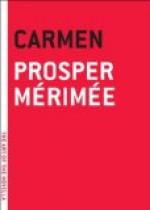in with some dragoons, and enlisted in the Almanza
Cavalry Regiment. Mountain folks like us soon
learn to be soldiers. Before long I was a corporal,
and I had been told I should soon be made a sergeant,
when, to my misfortune, I was put on guard at the Seville
Tobacco Factory. If you have been to Seville
you have seen the great building, just outside the
ramparts, close to the Guadalquivir; I can fancy I
see the entrance, and the guard room just beside it,
even now. When Spanish soldiers are on duty,
they either play cards or go to sleep. I, like
an honest Navarrese, always tried to keep myself busy.
I was making a chain to hold my priming-pin, out of
a bit of wire: all at once, my comrades said,
‘there’s the bell ringing, the girls are
coming back to work.’ You must know, sir,
that there are quite four or five hundred women employed
in the factory. They roll the cigars in a great
room into which no man can go without a permit from
the
Veintiquatro,** because when the weather
is hot they make themselves at home, especially the
young ones. When the work-girls come back after
their dinner, numbers of young men go down to see
them pass by, and talk all sorts of nonsense to them.
Very few of those young ladies will refuse a silk mantilla,
and men who care for that sort of sport have nothing
to do but bend down and pick their fish up. While
the others watched the girls go by, I stayed on my
bench near the door. I was a young fellow then—my
heart was still in my own country, and I didn’t
believe in any pretty girls who hadn’t blue
skirts and long plaits of hair falling on their shoulders.***
And besides, I was rather afraid of the Andalusian
women. I had not got used to their ways yet;
they were always jeering one—never spoke
a single word of sense. So I was sitting with
my nose down upon my chain, when I heard some bystanders
say, ‘Here comes the
gitanella!’
Then I lifted up my eyes, and I saw her! It was
that very Carmen you know, and in whose rooms I met
you a few months ago.
* Iron-shod sticks used
by the Basques.
** Magistrate in charge
of the municipal police
arrangements, and local
government regulations.
*** The costume usually
worn by peasant women in Navarre and
the Basque Provinces.
“She was wearing a very short skirt, below which
her white silk stockings—with more than
one hole in them—and her dainty red morocco
shoes, fastened with flame-coloured ribbons, were clearly
seen. She had thrown her mantilla back, to show
her shoulders, and a great bunch of acacia that was
thrust into her chemise. She had another acacia
blossom in the corner of her mouth, and she walked
along, swaying her hips, like a filly from the Cordova
stud farm. In my country anybody who had seen
a woman dressed in that fashion would have crossed
himself. At Seville every man paid her some bold
compliment on her appearance. She had an answer
for each and all, with her hand on her hip, as bold
as the thorough gipsy she was. At first I didn’t
like her looks, and I fell to my work again.
But she, like all women and cats, who won’t come
if you call them, and do come if you don’t call
them, stopped short in front of me, and spoke to me.




